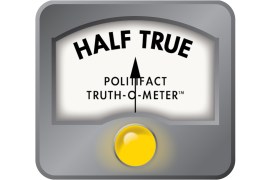Bernie Sanders Calls On FDA To Allow Pharmacists To Sell Older, Lower-Cost Version Of $375,000 Drug
Until December, patients could get the drug for free through the FDA's compassionate use program. Catalyst, the company that now sells the drug, has since triggered a firestorm of concern when it priced the medication at $375,000. In other pharmaceutical news: Maryland regroups after legal setback on legislation aimed at curbing price hikes; large majorities from both parties want Congress to focus on high costs; and more from the states.
Reuters:
U.S. Senator Sanders Urges FDA To Allow Older Versions Of $375,000 Drug
U.S. Senator Bernie Sanders this week urged regulators to allow pharmacies and manufacturers to resume distributing unbranded, lower-cost versions of a drug used to treat a rare neuromuscular disorder, according to a letter provided by his office to Reuters. The drug is now sold at a list price of $375,000 a year by Catalyst Pharmaceuticals Inc under the brand name Firdapse. It is used to treat Lambert-Eaton Myasthenic Syndrome, which affects about one in 100,000 people in the United States. (Abutaleb and Beasley, 2/28)
Stat:
Sanders Asks FDA To Allow Sales Of Older Versions Of $375,000 Rare-Disease Drug
The move is the latest effort by the lawmaker to confront Catalyst, which now sells a drug to treat Lambert-Eaton myasthenic syndrome, or LEMS. Until December, patients could obtain an unapproved version for free from Jacobus Pharmaceuticals, a small, family-run company, thanks to a compassionate use program overseen by the Food and Drug Administration. However, Catalyst has triggered a firestorm of concern because it priced its drug, called Firdapse, at $375,000. The company has attempted to mitigate criticism by pointing to a patient assistance program that should lower costs to about $10 a month, but Sanders has maintained that taxpayer-funded health programs — notably, Medicare and Medicaid — may still bear the brunt. (Silverman, 2/28)
Stat:
States, Eager To Lower Drug Prices, Regroup After Courts Strike Down Maryland ‘Price-Gouging’ Law
A legal setback in Maryland has state legislatures across the country re-examining their efforts to lower drug prices, with lawyers from Nevada to Illinois combing through bills to ensure they can withstand future challenges from pharmaceutical industry groups. State lawmakers’ interest has centered on a recently voided Maryland law that would have banned generic drug companies from hiking prices to a degree the state deems “unconscionable.” An appeals court ruled the law unconstitutional last year, and though Maryland’s Democratic attorney general had aggressively contested the decision, the Supreme Court announced on Feb. 19 that it would not hear an appeal. (Facher, 3/1)
NPR:
High Drug Prices: Americans Support Government Intervention
About a quarter of Americans surveyed say they've had trouble paying for their prescription drugs, and a majority welcome government action to help cut the cost of medications. A survey released Friday by the nonpartisan Kaiser Family Foundation finds that many people have skipped or rationed their prescription medications or have substituted cheaper over-the-counter drugs. The result? Those who ration their meds are often sicker, the poll finds. (Kodjak, 3/1)
Kaiser Health News:
Americans Ready To Crack Down On Drug Prices That Force Some To Skip Doses
Although Republicans tend to frown on government control over commerce, 8 in 10 Republican respondents said they support giving negotiating power to the $700 billion Medicare program in order to lower drug prices for seniors. More than 70 percent of all respondents back importing drugs from Canada and capping out-of-pocket Medicare costs. More than 80 percent said they favor making it easier for less expensive generics to compete with brand-name drugs. (Hancock, 3/1)
The Hill:
Liberal Groups Call On Dem Leaders To Go Bigger On Drug Price Legislation
A coalition of leading liberal organizations is calling on House Democratic leaders to take bolder stances in proposing legislation to lower drug prices and go further than allowing Medicare to negotiate drug prices. “Although Medicare negotiation is a much-needed reform, it is not the only solution needed to reach most Americans,” the letter to House Democratic leaders states. “We need reforms that lower stratospheric launch prices for new drugs and prevent price gouging on existing drugs for all payers.” (Sullivan, 2/28)
The Philadelphia Inquirer:
In Battling High Drug Prices, Pennsylvania Auditor General Takes Aim At Middlemen
Pennsylvania’s auditor general has once again zeroed in on the role of pharmaceutical middlemen, and this time for their “behind-the-scenes” negotiations with drug companies, in the agency’s study of rising drug prices, according to a report released Thursday. Auditor General Eugene DePasquale called for legislation that would require pharmacy benefit managers — whose role in the state Medicaid program came under review last year — to be paid by flat fees rather a percentage of the rebates they negotiate and win from drugmakers. (Dunn, 2/28)
The CT Mirror:
Bill Seeks To Reduce The Cost Of Prescription Drugs
Lawmakers have introduced a bill aimed at lowering the cost of prescription drugs in Connecticut, a pain point for many residents, especially the uninsured and people on high-deductible health plans. Under the proposal, anyone would be able to obtain a drug discount card through a program run by Comptroller Kevin Lembo’s office. (Carlesso, 2/28)
Miami Herald:
Camber Pharmaceuticals Recalls 87 Lots Of Losartan Over NDEA
The river of blood pressure and heart medication recalls continued to flow Thursday as Camber Pharmaceuticals announced a recall of 87 lots of Losartan Potassium for having too much NDEA. While NDEA (N-nitrosodiethylamine) occurs naturally in certain foods and drinking water, it’s classified as a probable human carcinogen by the International Agency for Research on Cancer. (Neal, 2/28)
In case you missed it: Check out our weekly roundup of news and opinions on rising drug costs.






